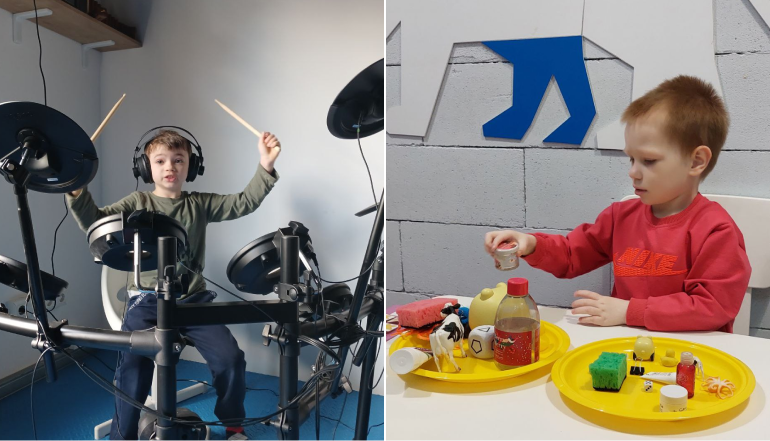Raising a child with an autism spectrum disorder (ASD) is a daily challenge for parents. Beyond unconditional love, it requires enormous reserves of patience, responsibility, and inner strength. Parents must learn to be a constant source of support for their child — a task that becomes even more difficult when external challenges like war and forced relocation occur.
Today, we share the story of Kateryna, who overcomes this journey with her five-year-old daughter Ania — from the first ASD signs to finding a new home and celebrating small victories through correctional sessions at LEVCHYK SPECTRUM HUB.
ASD signs and the war impact
Specialists note that early signs of autism spectrum disorders can appear at the age of 1,5-2 years:
- lack or absence of eye contact;
- difficulties in verbal or non-verbal communication;
- repetitive movements;
- hypersensitivity to sounds, light, or touch;
- lack of interest in peers’ engagement
In early childhood, these may seem like minor details — a child doesn’t respond to their name, avoids eye contact, repeats the same movements or words, or doesn’t play with other children. Sometimes, delayed speech or a lack of interest in joint play become the first red flags.
Kateryna recalls: “Until the age of one, Ania was an absolutely normal baby. She was developing well, smiling, and easily engaging with people. But after she turned 1 year old, these skills began to decline. She became withdrawn — quiet, serious. Her speech declined. She didn’t communicate with other children at all.”
The mother admits that at first, she went through a phase of denial. When Ania was one and a half years old, the full-scale war in Ukraine began — and diagnosis was no longer their main concern. The family faced new challenges: weeks spent under bombardment in Kharkiv forced them to leave their home and move to Lviv.
Kateryna recalls: “Constantly changing our place of residence had a big impact on Ania. Each move meant starting everything from scratch.”
For children on the autism spectrum, routine and a stable environment are crucial. Any change can cause severe anxiety and developmental regression. The war has become a double blow for many families. Moving to a new city or even a new country, losing familiar surroundings, hearing air alarms, and sensing their parents’ anxiety — all of these are powerful stressors for a child on the spectrum.
Support for IDP families at LEVCHYK SPECTRUM HUB
Support for a child on the autism spectrum begins with an accurate diagnosis. Specialists encourage parents not to fear this step, as early diagnosis ensures that the child receives timely assistance and can develop to their full potential. It significantly increases the chances of progress in learning and socialization. The next stage involves daily work, both at home and with specialists.
For Kateryna, LEVCHYK SPECTRUM HUB became a real lifeline. For over two years, the hub has been providing free professional correctional support to children with autism spectrum disorders from internally displaced families in Lviv. The center operates on the cost of the donors, partners, and the ongoing support of patron Vadym Stolar.

“A year ago, we started attending LEVCHYK. We have sessions every day except Sunday, and we can see her huge progress and her potential. She has started to understand more, to speak, to dress and eat on her own, which makes care so much easier,” Kateryna shares.
Systematic sessions with a speech therapist, neuropsychologist, and ABA specialist help children gradually develop communication, cognitive, and social skills. Regular work in a safe environment teaches them to better cope with stress, express their needs, and interact with others.
Kateryna admits that LEVCHYK gives huge emotional support to parents as well. People on a similar path have a mutual conversation or turn for advice:
“I love coming to LEVCHYK. When our children are in their sessions, we parents gather in the hallway and create our own mini support group. You have to be a doctor, a nutritionist, and a psychologist at the same time — constantly learning, working on yourself and with your child, and still finding time for yourself. If you don’t replenish your own resources, you can’t take care of your family.”
About LEVCHYK SPECTRUM HUB
The hub was founded by the Future for Ukraine Charitable Foundation in March 2023 in Lviv to support children with autism spectrum disorders whose families were forced to leave their homes due to the war.

At the hub, children receive over 500 free correctional sessions every month, five days a week. The team includes qualified ABA and PECS therapists, a speech therapist, and a psychologist. The correctional program includes behavioral therapy, speech therapy, sensory integration, adaptive physical education, and art therapy.
To support the hub or apply for correctional assistance, please visit the LEVCHYK website.




